Not every prospective customer is ready to buy right away. Most don’t want to talk to a salesperson the instant they visit your site.
However, they may be willing to give you their contact information in exchange for a resource you provide to them.
As competition for bottom of funnel attention grows, the importance of reaching people early in the consideration stage increases.
Marketers need to think of people in all stages of consideration, speaking to those who might not be pulling out their pocketbooks instantly but are seriously researching.
What follows are five demand generation tactics you can promote via PPC campaigns to get users interested enough in your services to enter the marketing funnel.
1. Newsletter Signup
Email remains a powerful tool for directly reaching prospects. According to Hubspot, 86% of professionals prefer email for business communication.
When a user knowingly signs up for a newsletter, they are indicating an interest in your service and a desire to hear from your brand.
Signing up for a newsletter also requires less commitment than requesting a demo or talking to sales.
You’re likely to attract more people who aren’t yet ready to buy and wouldn’t otherwise have contacted you, but may be potential customers later on.
Social ads reaching people at the top of the funnel can help to capture those who may be eligible prospects down the line.
For instance, if you’re promoting photography courses, you can start by targeting people with photography-related Facebook interests and drive them to sign up for a newsletter.
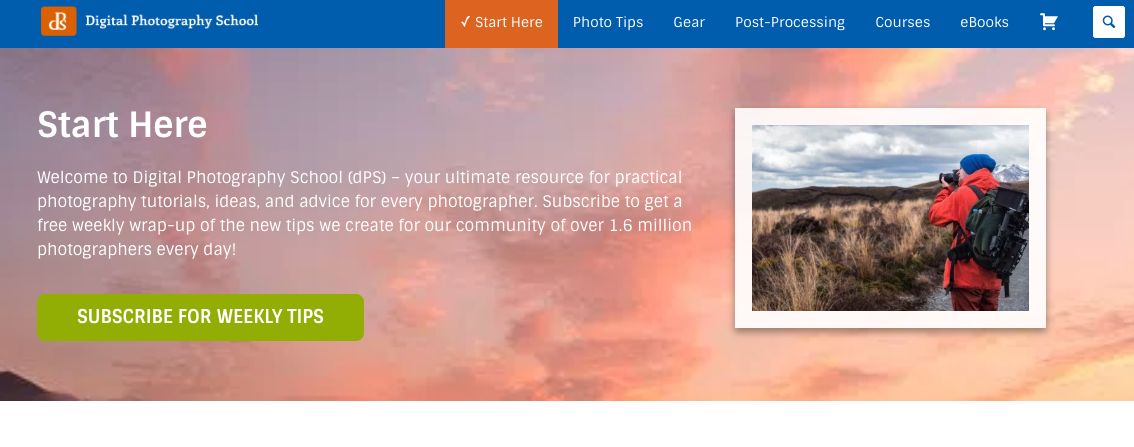 After users sign up, you can build credibility by continuing to share advice via email, remarketing, and customer match targeting.
After users sign up, you can build credibility by continuing to share advice via email, remarketing, and customer match targeting.
Once you’ve built trust via sharing content, you can upsell them on the value of paying for a full-fledged course.
2. Asset Download
Providing an asset behind a gated form is a time-tested demand generation tactic for collecting prospect contact information.
Assets may include:
- Whitepapers.
- Ebooks.
- Data sheets.
- Infographics.
- Case studies.
In search, you can target top-of-funnel keywords to point users to asset downloads instead of an immediate sales conversation.
Assets can also be attractive offers for display ads, particularly for technical industries where users are likely to engage in an extensive comparison process before deciding to purchase a solution.
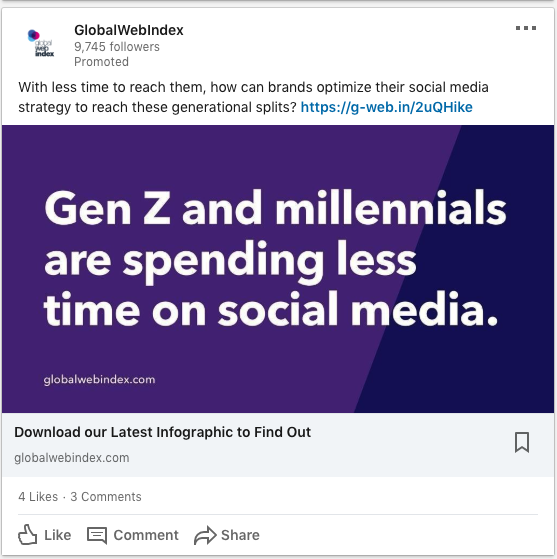
Besides pointing to a landing page, you can also use lead generation forms in Facebook or LinkedIn to collect users’ contact info. Without needing to leave their social feeds, users can fill out the forms to receive links to assets.
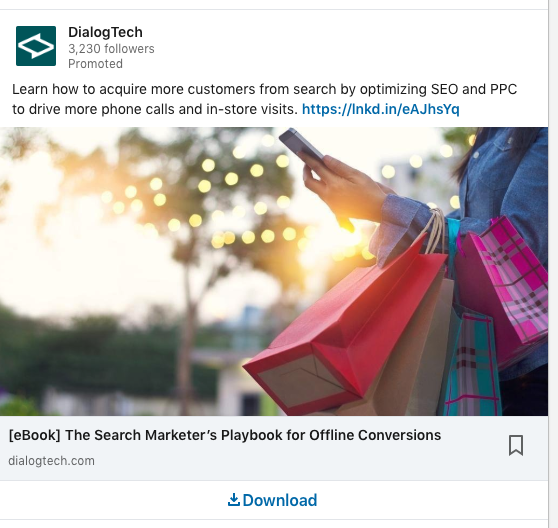
Built-in lead forms can provide a higher conversion rate than landing pages, due to the ease of filling out. It also provides more accurate contact details, since the data is auto-populated from the user’s profile.
3. Webinar Registration
Everyone has a preferred method for absorbing content, whether reading, listening, or watching a video.
Webinars offer an opportunity to speak to those who might not be interested in reading through a whitepaper.
A webinar can either be audio-only or in a video format.
Also, it may be a one-time live event that people can sign up for in advance or an on-demand recording that people can access at any time.
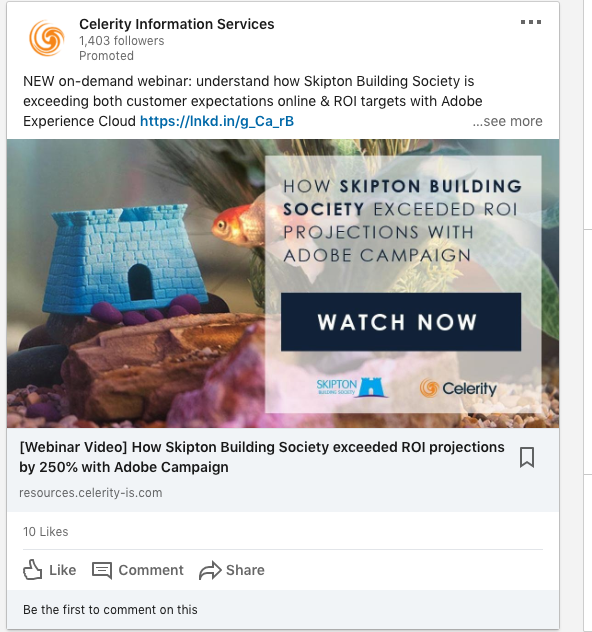
In either case, both display and social advertising can effectively promote webinars to the right people. Remarketing to previous website visitors can reach those who might have been considering your service and want to learn more.
For more relevance, you can segment audiences based on pages they viewed, such as product pages, service pages, and blog posts related to the webinar topic.
Custom audiences built from uploaded lists of existing contacts can also be solid targets for webinars. You may want to reach people who have entered a sales pipeline but have not closed on a deal.
In addition, depending on the size of your CRM lists, you can even segment out prospects based on industry.
For instance, you might have a list of IT professionals in the finance industry to reach with a webinar about cybersecurity for banking.
Beyond targeting people to sign up for webinars, keep track of the list of actual attendees.
You can then continue to target those people who attended with additional messaging further down the funnel to push them to a product demo or conversation with sales.
4. Online Assessment
An online assessment can help to gate out users who fit your target audience and are serious about engaging with your services. This could be:
- A multiple choice quiz.
- A series of fill-in-the-blank questions.
- A combination of the above.
When developing a list of questions, consider a balance between asking enough to determine if users are a proper fit but not so many questions that they’re discouraged from completing a quiz.
It may be helpful to call out from the start the number of questions or the expected time to finish the assessment.
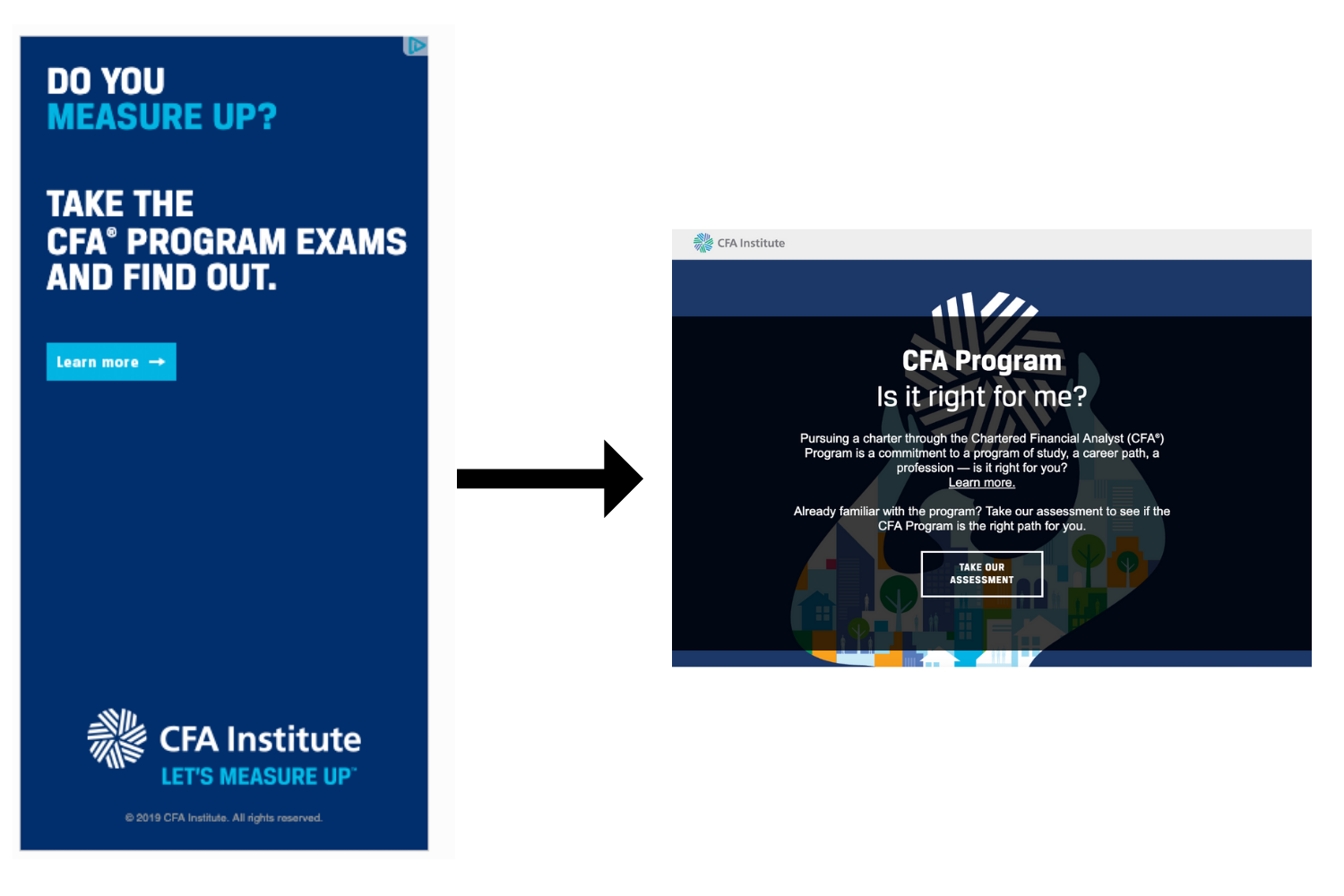
At the end of the assessment, ask users for contact information, and send the data into your CRM. Map fields wherever possible to categorize people based on the answers they provided.
For instance, you might have a question related to their top challenge, and you can use their answer to send a resource related to what they selected.
5. Trade Show Promotion
When exhibiting at a trade show or conference, PPC can be a great tactic to get people to your booth.
By reminding prospects that you will be at an event, you can help promote a face-to-face conversation, which is often one of the strongest means to move people toward a purchase decision.
First of all, make sure people know where to find you by mentioning a booth number. Consider including an incentive for people to speak to you, such as the chance to win a raffle at your booth or a discount if they mention the ad.
If you have the capacity to set up scheduled conversations, link to a signup form where people can select a time to speak with your team. Concurrently, you can opt people into an email list, allowing for further outreach whether they show up at the event or not.
For targeting, consider remarketing and customer list targeting, as mentioned before. If you can obtain a list of companies represented at the event, upload that as an account list to LinkedIn and layer on titles or job functions of people likely to be attending.
Conclusion
These are just a few examples of demand generation tactics that can prove your knowledge to potential customers while convincing them to share their contact information with you.
Ultimately, think of what resources will provide the most value to prospects. Take inventory of existing assets and map them to stages of the marketing funnel. Make sure to identify gaps for the creation of new assets.
In addition, test different methods of promoting these resources. Lead generation forms within LinkedIn and Facebook can be powerful tools to increase conversion rate.
When considering targeting, remarketing, and contact list targeting can narrow reach to people who have expressed some level of interest, while lookalikes can expand reach to new qualified prospects.
Combined with carefully run PPC campaigns, these demand generation tactics can help to:
- Increase lead volume.
- Better qualify potential customers.
- Move existing prospects through the funnel more quickly.
Salespeople and digital marketing teams alike will win with the right demand gen elements leading to the right followup.
More Resources:
- 4 Common Goals of PPC Landing Pages for B2B Lead Gen Campaigns
- 7 Ways to Use Facebook Lead Gen Ads You May Not Have Thought Of
- PPC 101: A Complete Guide to PPC Marketing Basics
Image Credits
Featured Image: Pexels.com
Screenshots taken by author, April 2019





